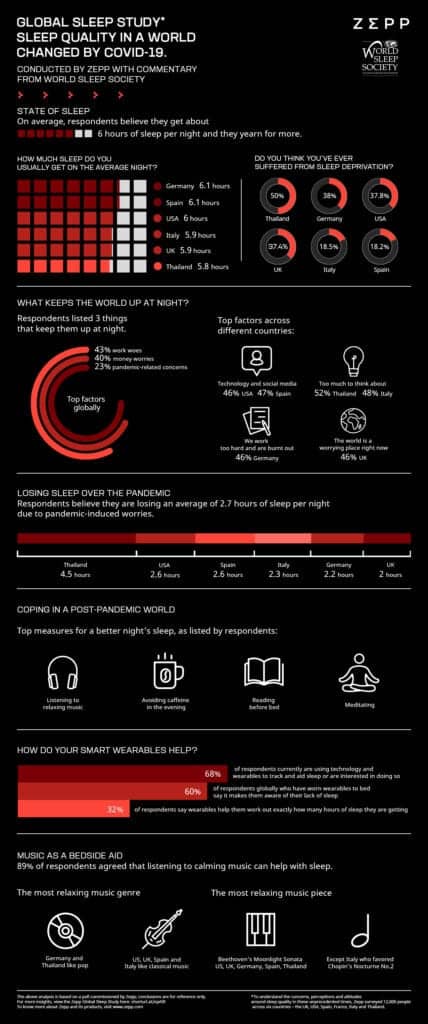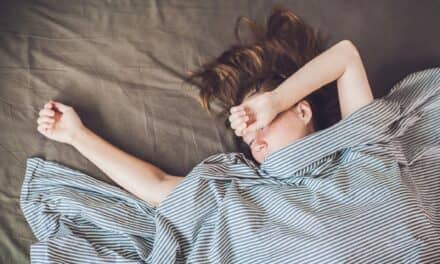Consumer sleep tracking wearable company Zepp hired Perspectus Global to poll 2,000 respondents each in six regions—the United States, United Kingdom (UK), Spain, France, Italy, and Thailand—to understand concerns, perceptions, and attitudes around sleep quality during the COVID-19 pandemic. The poll was conducted in October 2020. Here’s what it found.
Pandemic & Other Anxieties
Thailand was revealed as the nation that was most sleep deprived, with half of respondents (50%) claiming they were definitely sleep deprived, followed by Germany (38%), United States (37.8%), UK (37.4%) Italy (18.5%), and Spain (18.2%). 43% of respondents attributed the problem to work woes, 40% to money worries, and 23% to pandemic-related concerns.
COVID-19 lockdowns were also deemed to have changed people’s sleeping patterns, with more than a third (33.6%) of respondents saying they go to bed later than usual, and 20% saying they find it harder to sleep. Respondents believe they are losing an average of 2.7 hours of sleep per night due to pandemic-induced worries, with respondents in Thailand clocking the highest average loss of 4.5 hours per night.
Almost half of respondents in the US (46%) and Spain (47%) feel that they live in a sleep-deprived nation due to technology and social media. Thailand respondents (52%) believe it results from having too much to think about and Italians agree (48%). Respondents in Germany (46%) think it is because they work too hard and are burnt out and those in the UK (46%) say it is because the world is a worrying place right now.
[RELATED: Study: Pandemic Has Severely Disrupted Sleep, Increasing Medication Use]
Coping in a Post-Pandemic World
People are also actively taking measures to help themselves sleep better in this time. Top measures include listening to relaxing music, avoiding caffeine in the evening, reading before bed, and meditation. 60% of respondents who have worn wearables to bed say it makes them aware of their lack of sleep. Data from wearables are believed to have helped respondents work out the exact number of hours of sleep they have, and improve their sleeping patterns.
“By tracking sleep, you will have a better understanding of if you are achieving the three components of healthy sleep—duration, or the length of sleep, continuity, meaning sleeping without fragmentation, and depth, which is sleep deep enough to be restorative,” says Lourdes DelRosso, MD, co-chair of World Sleep Day, World Sleep Society, in a release.

Music as a Bedside Aid
89% of respondents agreed that listening to calming music can help with sleep. Poll results show Beethoven’s Moonlight Sonata was the most popular track for all nations to listen to at bedtime, with the exception of Italy, with respondents favoring Chopin’s Nocturne No.2. Respondents in Germany and Thailand said their favorite music genre to listen to was pop, whereas respondents in the US, UK, Spain and Italy said it was classical music.
Zepp Personalized Lullabies & Sleep Tracking
Recognizing music’s role in helping people fall asleep, Zepp has worked with Swedish creatives to launch a digital Lullaby Generator.
The free-to-use Lullaby Generator is designed to help users create tailor-made music based on their very own sleep patterns for an enhanced night’s rest. Existing Zepp users can login to share their sleep metrics and automatically produce a unique and personalized lullaby. Non-Zepp users can also participate by answering a series of questions about their sleep habits.
In August, Zepp launched a line-up of wearables designed with wellness in mind. The new Zepp E series leverages the power of artificial intelligence (AI) and cutting-edge technology to convert vital health statistics into actionable insights that help users effectively monitor their physical and mental wellbeing.
Photo 188053432 © CrailsheimStudio – Dreamstime.com




